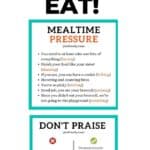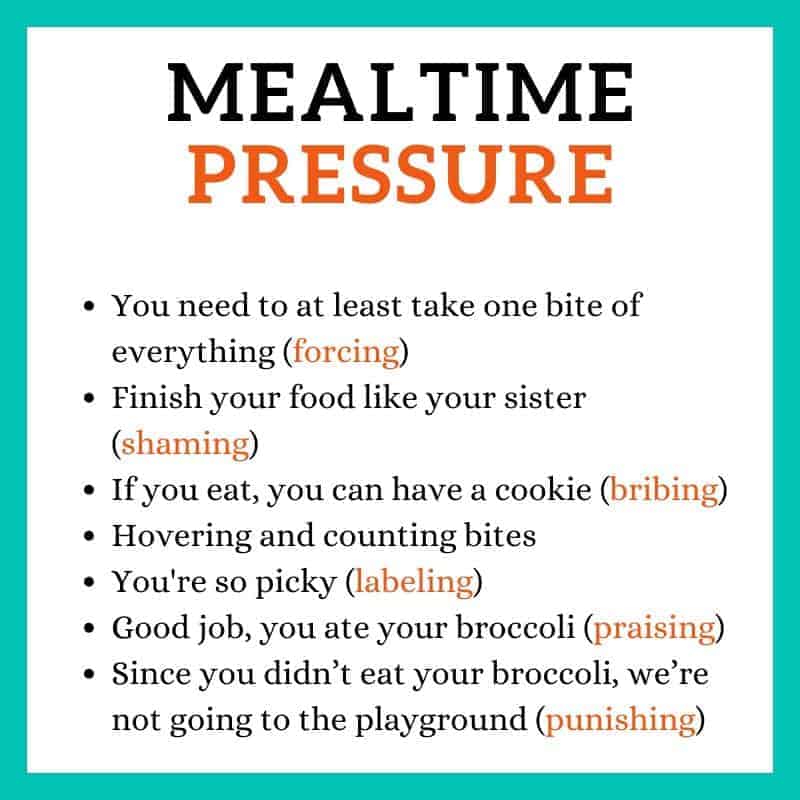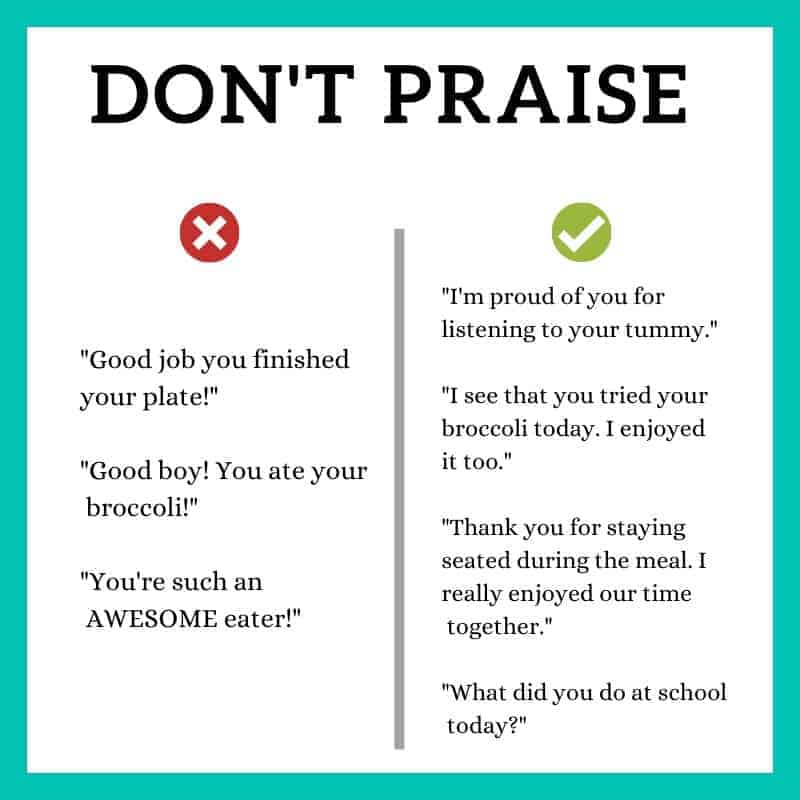So much easier said than done. This I know. But this is THE place to start!
Different Forms of Pressure
The formal definition of pressure: the use of persuasion, influence, or intimidation to make someone do something.Here are some ways parents turn to in an effort to get their children to finish their meal.
What’s wrong with pressuring?
It doesn’t work!! While your child may respond to your pressure and eat a bit more, this is only a temporary solution. And it can have negative, lasting effects on not only their health but on their lifelong relationship with food.
Eating no longer becomes an enjoyable experience. Your child can develop negative associations with the food and learn to dislike or avoid the food altogether. I always like to encourage parents to draw from their own experiences!
Perhaps you were forced to eat a certain food(s) growing up. What are your feelings towards that food now? Maybe you’ve learned to enjoy it over the years. Maybe not. But something tells me those negative memories surrounding the food haven’t been completely erased from your mind In fact, according to this retrospective study, college students who remembered being pressured to eat as kids continue to dislike the foods that their parents forced them to eat. Furthermore, they reported that given the choice, they would avoid these foods today.
Your use of pressure can undermine your child’s innate ability to self-regulate their food intake. They may ignore their hunger and fullness cues and eat more to earn your approval. Even though their body and brain are telling them that they’re full, they won’t stop until their plate is cleaned.
Again, if you were forced to clean your plate as a child, you can probably relate to this. On the flip side, they may eat less than what they’re hungry for in defiance and further fuel their picky eating.
Your child will learn to use food as a means of asserting their independence, which will only promote mealtime battles.
Why you shouldn’t praise your child
“Good job! You finished your plate tonight!” I want to take a moment to elaborate a bit more on why you shouldn’t praise your child for eating as it is a source of confusion for a lot of parents. Isn’t praising your child a good thing? Won’t it reinforce them to repeat the desired behavior? If done correctly, praising our children can do wonders for their self-esteem and confidence! However, when it comes to eating, it’s best to avoid it. WHY? Your child may learn to value how much they eat more than following their appetite. If your child is a pleaser, they may override their hunger and fullness cues in order to please you. On the other hand, if your child is an autonomy-seeker, they may take it as pressure and shut down completely. Your child may also start thinking that eating xyz or eating more makes them a good boy/girl. Meal time and eating is not a performance. I’m going to assume that you wouldn’t praise your child for eating a cookie or ice cream. If you praise them for eating their broccoli, for example, you’re teaching them that some food are good and some are bad. This can truly damage their relationship with food. You want to put ALL foods on a level playing field.
What should you do instead?
Instead, of looking through your short-term lens -“I just want my child to eat now!”, I highly encourage you to think long-term and consider: “How can I help my child become a joyous, mindful eater who has a healthy relationship with food? How can I make their eating experience less scary? more safe and fun?” Trust your child from the very beginning! Trust their innate ability to self-regulate and that they know more about their eating than we do. Give your child the opportunity to listen to their body and eat based on their natural appetite, not external influences of how much and what they should eat. Reframe your mindset from getting your child to eat (which is not your job) to serving well-balanced meals and enjoying and exploring food together. That means, don’t come to the table with an agenda. Instead, focus your efforts on setting mealtime structure and limits. Teach your child what is appropriate to do and not do and allow them to exercise their independence within those limits Check portion sizes. Oftentimes, our desire to see them grow can make us forget how much smaller their tummies are. Keep the language neutral. Instead of saying, “Ugh! You are not eating your broccoli again! (in an angry voice)” say “Mommy’s really enjoying her broccoli today. Could you share?” Don’t forget role modeling is SO powerful. Lead by example. AND also remember that seeing and touching all count as exposures! Instead of saying “Good job! You ate your broccoli!” say “Looks like you’re enjoying your broccoli today.” Simply acknowledging in a neutral manner will encourage your child to try it again. Better yet, don’t even talk about the food. There’s no need to comment on what your child is or isn’t eating. Instead, use mealtimes as family bonding time. Talk about the things you guys did earlier in the day, the books you read, what they learned at school, etc.
Other Resources
Is my toddler turning into a picky eater?Positive parenting when your toddler won’t eatHelp! My toddler won’t eat!What to do when your child won’t eat dinnerMy child only wants snacksHow to help your underweight child
To Sum
The less pressure you put on your child, the better. Don’t take their refusal to eat personally. It’s easy for us, as parents, to feel guilty and blame ourselves. We start to question everything. Am I serving the “wrong” food? Is it because my food isn’t tasty? I want to remind you that your child’s refusal has more to do with testing limits, exerting independence, and fear of trying new food (food neophobia peaks between 2-6 years of age) than the food itself. While it’s hard not to worry during this time when eating just seems all over the place, know that your child’s appetite and eating behaviors will level out over time. Remain calm and stick to your mealtime structure. Your child may not eat with the gusto you wish they would for a while, but doing so will go a long way in helping your child establish healthy eating habits. Not to mention, your times around the dinner table will be that much sweeter!


